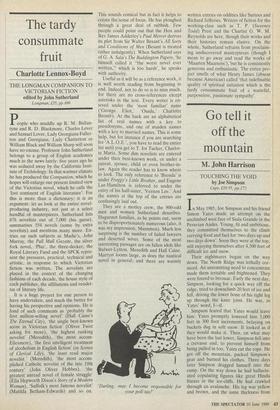The tardy consummate fruit
Charlotte Lennox-Boyd
THE LONGMAN COMPANION TO VICTORIAN FICTION People who muddle up R. M. Ballan- tyne and R. D. Blackmore, Charles Lever and Samuel Lover, Lady Georgiana Fuller- ton and Georgiana, Lady Chatterton or William Black and William Sharp will soon have no excuse. Professor John Sutherland belongs to a group of English academics much in the news lately: five years ago he was seduced away by the California Insti- tute of Technology. In that warmer climate he has produced the Companion, which he hopes will enlarge our present limited view of the Victorian novel, which he calls the `lost continent of English literature'. For this is more than a dictionary; it is an argument: let us look at the entire novel- producing industry, not just at a select handful of masterpieces. Sutherland lists 878 novelists out of 7,000 (his guess), summarises 554 novels (some by extra novelists) and mentions many more. En- tries on such subjects as Mudie's, John Murray, the Pall Mall Gazette, the silver fork novel, `Phiz', the three-decker, the Royal Literary Fund and the SPCK repre- sent the pressures, practical, technical and artistic, in response to which Victorian fiction was written. The novelists are placed in the context of the changing fashions of each decade, the house style of each publisher, the affiliations and vendet- tas of literary life.
It is a huge project for one person to have undertaken, and much the better for having his perspective and opinions. He is fond of such comments as 'probably the first million-selling novel' (Hall Caine's The Eternal City), 'the single best-known scene in Victorian fiction' (Oliver Twist asking for more), 'the highest ranking novelist' (Meredith), 'the most accom- Ellesmere), 'the first intelligent treatment of alcoholism in English fiction' (in Scenes of Clerical Life), 'the least read major novelist ' (Meredith), 'the most accom- plished Catholic novelist of the late 19th century' (John Oliver Hobbes), 'the greatest unread novel of female struggle' (Ella Hepworth Dixon's Story of a Modern Woman), 'Suffolk's most famous novelist' (Matilda Betham-Edwards) and so on. This sounds comical but in fact it helps to create the sense of focus. He has ploughed through a great deal of rubbish. Few people could point out that the Hon and Rev James Adderley's Paul Mercer derives its plot, from Sir Walter Besant's All Sorts and Conditions of Men (Besant is treated rather indulgently). When Sutherland says of G. A. Sala's The Baddington Papers, 'he himself called it "the worst novel ever written," which is too harsh', he speaks with authority.
Useful as it will be as a reference work, it is well worth reading from beginning to end. Indeed, not to do so is to miss much, for there are no cross-references except asterisks in the text. Every writer is en- tered under the 'most familiar' name (`George Eliot,' Ouida,' Charlotte Brontë). At the back are an alphabetical list of real names with a key to pseudonyms, and one of maiden names with a key to married names. This is some help, but for instance if you are searching for `A.L.O.E.', you have to read the entire list until you get to T. for Tucker, Charlot- te Maria. Some dim novelists are entered under their best-known work, or under a parent, spouse, child or even brother-in- law. Again the reader has to know where to look. The only reference to 'Brenda' is under Froggy's Little Brother, and Eugene Lee-Hamilton is referred to under the entry of his half-sister, 'Vernon Lee.' And the names at the top of the entries are confusingly laid out.
They are a motley crew, the 900-odd men and women Sutherland describes. Huguenot families, as he points out, seem to be disproportionately numerous (also, it was my impression, Manxmen). Much less surprising is the number of failed lawyers and deserted wives. Some of the most interesting passages are on fallen idols like Bulwer-Lytton, Meredith and Hall Caine. Marryat looms large, as does the nautical novel in general; and there are warmly 'Darling, may I become responsible for your poll tax?' written entries on oddities like Surtees and Richard Jefferies. Writers of fiction for the working-class such as T. P. (Sweeney Todd) Prest and the Chartist G. W. M. Reynolds are here, though their works and their histories remain elusive. On the whole, Sutherland refrains from proclaim- ing undiscovered masterpieces (though I mean to go away and read the works of `Maarten Maartens'), but he is consistently generous and enthusiastic. The entire pro- ject smells of what Henry James (absent because American) called 'that indefinable quality of spiritual initiation which is the tardy consummate fruit of a wasteful, purposeless, passionate sympathy'.


























































 Previous page
Previous page